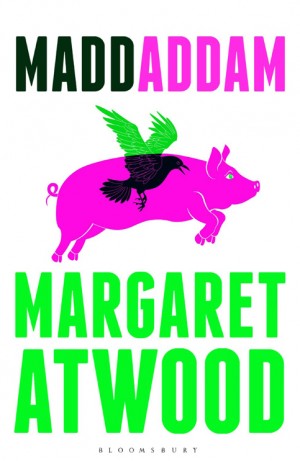You have no items in your cart. Want to get some nice things?
Go shopping
“Toby cannot tell the story tonight. She is too sad, because of the dead ones. The ones who became dead, in the battle. So now I will try to tell this story to you. I will tell it in the right way, if I can.”
It’s become impossible to discuss Margaret Atwood’s future-fiction work – in particular, the trilogy of books that she’s spent the past decade publishing, starting with 2003’s Oryx and Crake and ending with MaddAddam – without talking about her discussion of them as speculative (not science) fiction. Her argument is that everything in the books exists in one form or another; it’s all plausible. This might be the case for the technology, but possibly isn’t for the narrative of the book which, in this closing volume, takes in storylines that veer towards the fantastical – but never to the detriment of the story that’s being told.
The world that’s been constructed in this trilogy is one of gene-splicing, of mutants and chemical warfare; of genetically engineered Crakers, post-humans that have been mentally simplified and turn blue when mating; of hybrid animals like wolvogs and pigoons, which run rampant across a world being reclaimed by nature. It’s not an easy world to dive into with this third and final volume – a ‘previously on’ style prologue makes that clear from the get go. And while the previous two novels have perhaps been more serious in terms of their storylines, MaddAddam manages to bring far more humour into the series.
That humour comes naturally to Atwood, who seems to revel in the world that she’s created. She pushes her characters through an inventive and challenging narrative which moves between narrative voice, tense and tone with the skill of somebody writing at the top of their game. Indeed, her recent fiction experiments on Wattpad (The Happy Zombie Sunrise Home, written with Naomi Alderman) seem to have enforced a real sense of freedom in Atwood’s day-job fiction, particularly with regards to the novel’s endgame.
“The breeze dies, damp heat rises from the earth, the shadows blend together. Mosquitoes whines. Here’s the moon, not so full any more. The hour of the moth comes round again.”
And the endgame is the novel’s crux: a build of events and characters, pushing them towards a seemingly inevitable finality that both reflects upon our own societal fears, and delivers a satisfyingly large-scale climax for fans of the world that Atwood has constructed. It’s beautifully written and superbly paced, a superb understanding of delivering a balance of story-driven momentum, and of giving readers high – and low – points for the characters that they have spent three books with. Not every character is going to survive, that much is clear from the off; but it’s how Atwood handles their fates that is the most impressive.
“If you don’t stop crying, I can’t go on with the story.”
But at its heart, Atwood’s writing is as it has always been: an extremely potent, powerful examination of humanity. While some readers may feel shortchanged by some of the character developments (Toby, one of the two main protagonists, seems to have become slightly more girlish in the transition from Year Of The Flood to MaddAddam, a likely necessary shift to move both her character and the story forward; Jimmy is maybe not as present over the course of the book as some readers may like), the book needs to be read as part of a whole; the final chapters of a trilogy that presents an alternately terrifying and plausible version of a future that we would do well to avoid.
MaddAddam was published in August 2013. Buy it from Foyles.




